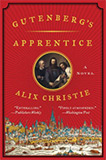Reading Guide Questions

Please be aware that this discussion guide will contain spoilers!
- The novel begins with Peter Schoeffer telling the story to a writer. In what ways are verbal and written storytelling similar or different?
- What does Peter retain and lose in his shift from artisan scribe to printmaking engineer?
- Considering Peter's initial conflict between the scribe's art and the printing press, what's the relationship between art and technology?
- A central issue in Mainz is the ancient one between homo faber—the man who makes things—and he who sells or trades what others make. What is the conflict here? How might it continue in contemporary culture? Examine the irony of craftsmen making by hand something that would "replace the hand of man."
- Peter admits late in his life that the printing press never brought "the liberation that it promised" by lifting man "from bigotry and want and greed." How might it have done this? What
forces kept it from happening?
- In what ways does Peter's experience and identity as an orphan affect his life and relationships?
- Hermann Rosenberg, a vicar, argues that the printing press could secure knowledge with a standardized text and avoid cultural disorder. In what parts of culture might such a lack of
variation be problematic?
- How do the many references to the biblical stories woven throughout add to the novel? Which seem the most powerful or poignant?
- Peter thinks one of Gutenberg's brilliant abilities is "to see a thing—a person too—in pieces." What might this mean? What are its costs?
- Peter also describes Gutenberg as "beholden to no group…nor…any other man. He stood outside, alone, a solitary soul." How did such disconnection serve or hinder him? To what
degree might such behavior be a necessary precondition for brilliance or innovative thinking?
- When Peter first sees the print from metal letters he carved, "it all changed." What is the nature of such a "spark"?
- Gutenberg makes harsh statements about the value of women, referring to Eve, Pandora, and Magdalene. Consider the two women in Peter's life, Grede and Anna Pinzler. How are they
powerful, valuable women?
- What constituted Peter's "unexpected joy" working with the various craftsmen in the secret workshop?
- What qualities in Gutenberg caused him to risk the failure of the printing press itself? Were these qualities necessary and unavoidable for him?
- As the workshop falls apart Peter realizes that the work there had a series of technical rites and rituals and prayer-like vocabulary that bound the workers together. How does this occur?
What's the nature of rites and rituals that they can have this effect even in a secular activity?
- In what ways is our contemporary shift from print to digital media similar to or different from the shift from hand-written to mechanically printed text?
Unless otherwise stated, this discussion guide is reprinted with the permission of Harper Perennial.
Any page references refer to a USA edition of the book, usually the trade paperback version, and may vary in other editions.

 Book Reviewed by:
Book Reviewed by:



